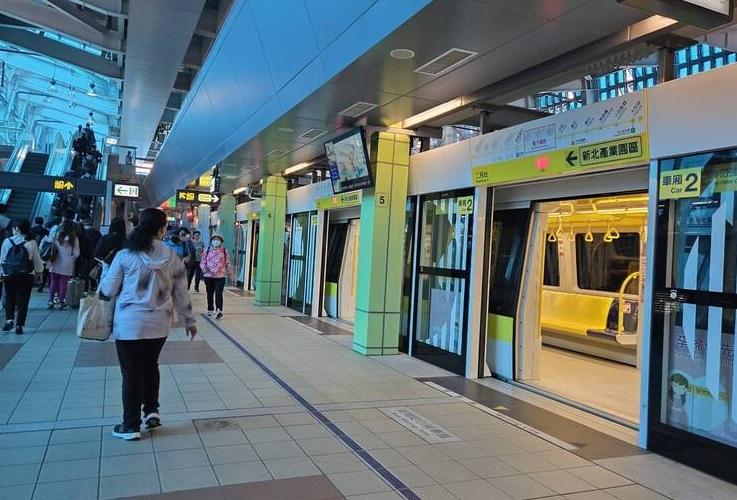Train frequency on New Taipei City's Circular Line would increase starting on Aug. 1, with intervals during peak hours shortened to under five minutes, the metro operator announced today.
During weekday rush hours (7am to 9am and 5pm to 7:30pm), trains are to arrive every four minutes and 50 seconds, down from the current five minutes and 30 seconds, the New Taipei Metro said in a news release.

Photo: Lai Hsiao-tung, Taipei Times
Off-peak intervals would also improve from 10 minutes to seven minutes and 30 seconds on weekdays (9am to 5pm) and weekends (10am to 6pm), it said.
The average passenger wait time is to drop from four minutes 30 seconds to three minutes 50 seconds, easing congestion and improving rider comfort.
According to the company, weekday train trips would increase from 283 to 329, a 16.3 percent jump, while weekend trips would rise from 229 to 271, an 18.3 percent increase.
A full timetable is to be published, allowing passengers to check train schedules via platform displays, gate monitors, the official Web site or QR codes available in stations and onboard, the company said.
The Ankeng Light Rail, which connects to the Circular Line at Shisizhang Station, would also adjust departure times to improve transfer efficiency, but its frequency would remain unchanged, it said.

Taiwan is to commence mass production of the Tien Kung (天弓, “Sky Bow”) III, IV and V missiles by the second quarter of this year if the legislature approves the government’s NT$1.25 trillion (US$39.78 billion) special defense budget, an official said yesterday. Commenting on condition of anonymity, a defense official with knowledge of the matter said that the advanced systems are expected to provide crucial capabilities against ballistic and cruise missiles for the proposed “T-Dome,” an advanced, multi-layered air defense network. The Tien Kung III is an air defense missile with a maximum interception altitude of 35km. The Tien Kung IV and V

The disruption of 941 flights in and out of Taiwan due to China’s large-scale military exercises was no accident, but rather the result of a “quasi-blockade” used to simulate creating the air and sea routes needed for an amphibious landing, a military expert said. The disruptions occurred on Tuesday and lasted about 10 hours as China conducted live-fire drills in the Taiwan Strait. The Civil Aviation Administration (CAA) said the exercises affected 857 international flights and 84 domestic flights, affecting more than 100,000 travelers. Su Tzu-yun (蘇紫雲), a research fellow at the government-sponsored Institute for National Defense and Security Research, said the air

Taiwan lacks effective and cost-efficient armaments to intercept rockets, making the planned “T-Dome” interception system necessary, two experts said on Tuesday. The concerns were raised after China’s military fired two waves of rockets during live-fire drills around Taiwan on Tuesday, part of two-day exercises code-named “Justice Mission 2025.” The first wave involved 17 rockets launched at 9am from Pingtan in China’s Fujian Province, according to Lieutenant General Hsieh Jih-sheng (謝日升) of the Office of the Deputy Chief of the General Staff for Intelligence at the Ministry of National Defense. Those rockets landed 70 nautical miles (129.6km) northeast of Keelung without flying over Taiwan,

A strong continental cold air mass is to bring pollutants to Taiwan from tomorrow, the Ministry of Environment said today, as it issued an “orange” air quality alert for most of the country. All of Taiwan except for Hualien and Taitung counties is to be under an “orange” air quality alert tomorrow, indicating air quality that is unhealthy for sensitive groups. In China, areas from Shandong to Shanghai have been enveloped in haze since Saturday, the ministry said in a news release. Yesterday, hourly concentrations of PM2.5 in these areas ranged from 65 to 160 micrograms per cubic meter (mg/m³), and pollutants were